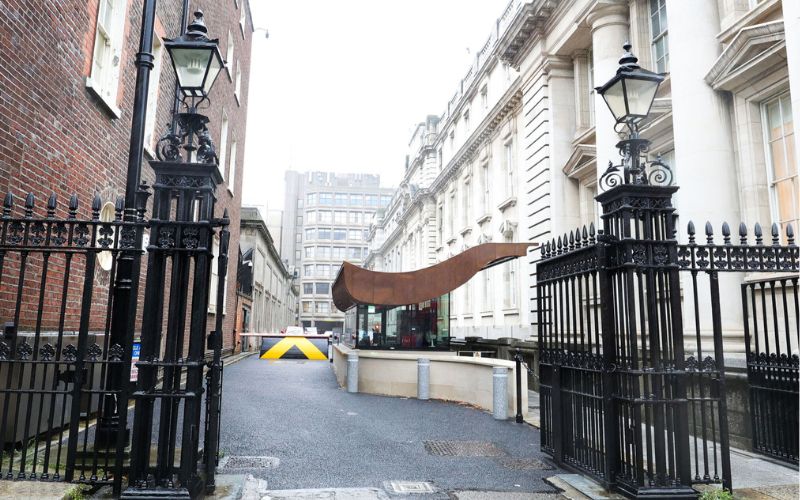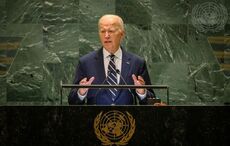It is not often that a member of Galway County Council has to field a series of calls from concerned citizens in California, Texas, and Tennessee, but this has been no ordinary week in the life of Shaun Cunniffe.
The Independent Councillor has led calls for the Richard ‘Dick’ Dowling memorial at Tuam Town Hall to be removed after being overwhelmed by correspondence from the United States since the controversy erupted last Saturday.
Cunniffe has also received criticism from people in the North Galway town who feel local politicians should have more to deal with than the removal of a 19-year old plaque from the town center.
CNN reported that “At least one of Cunniffe's fellow lawmakers -- Donagh Killilea, chairman of the Municipal District Council called it a kite flying exercise by Councillor Cunniffe and he believes debating the Dowling memorial is a waste of time and says, "The majority (of Tuam residents) are not interested in the subject, where getting on with everyday life is too important."
"I'm not a believer in taking part in any act that tries to suppress history; it is what it is. I doubt very much that many people knew it existed until it was raised in the press recently," Killilea said in an email to CNN. "There are no moves to dismantle and hide the concentration camps in Germany and Poland."

Donagh Killilea
"We are currently dealing with the mother and baby home issue here in our town. This is just a kite-flying exercise by (Councilor Cunniffe), and it's not going down well within our community," Killilea wrote. "The mother and baby home investigation far outweighs the level of importance of a councilor looking to score a few points on national and international media."
Hardly any local, including Cunniffe, realized that Tuam was the only town in Ireland to commemorate a Confederate Army leader from the US Civil War until last weekend.
Few, if any, had considered Dowling’s links to slavery when the town decided to honor him by erecting a plaque 19 years ago.
“I got so many calls from the US after this story broke on IrishCentral last weekend,” he tells me. “I was shocked to get so many calls, but I was also moved by the concerns of the people who rang me.
Read More: Calls for removal of Confederate plaque in Ireland
“Many of them were African-Americans. They said they had gone through so much in the south of the US. They said they found it offensive that there was a memorial in my town to a man who rented slaves. I was sympathetic towards them and could see their point of view in asking it for it to be removed.
“They asked me to imagine how an African-American tourist might feel if he or she saw a monument to a person who was pro-slavery in the middle of our town. I could see that they were offended and I promised to raise the matter at our Municipal Area Meeting on September 11.”
Cunniffe does not want to get rid of the memorial altogether, but he feels the Town Hall is not an appropriate location. He fears it gives “tacit approval” to the Confederacy and what it stood for, including the legality of slavery.

Shaun Cunniffe
Many local politicians are on holidays in August, including Cllr Tom McHugh (Fine Gael) whose bar at the town’s Ard Ri Hotel is named after Dick Dowling. Cllr McHugh was not available for comment this week.
A Texan hero for the Confederacy, Richard Dowling was born in Milltown, just outside Tuam, in 1837. His parents were evicted from their land during the Great Famine and Richard was just nine years of age when he set sail for America.
Leaving their traumatized parents behind in a Galway workhouse, Dowling and his sister moved to New Orleans in 1846 where they lived with family friends. At the time, distressed and impoverished Irish immigrants were flocking to a bitterly divided America.
A wave of anti-immigrant sentiment in New Orleans in 1856, when the Know Nothing party achieved victory, prevented Irish residents from seeking work. It was because of this discrimination that Dowling headed west to find a new home in Houston, Texas.
Read More: Want to get rid of Confederate statues? Send in the Irish
Dowling became a successful saloon and property owner following his move to the frontier town, but it was his role in the Confederate Army which turned him into a household name in both Texas and Ireland.
The Tuam plaque, erected in his honor in 1998, describes Dowling as a business and civic leader in Houston. It also mentions that he showed great bravery to repulse a Federal invasion fleet at the “Battle of Sabine Pass” in 1863.
Cunniffe said that nobody in Tuam stopped to consider that Dowling was on the side of those who supported slavery when the plaque was erected in his honor in 1998. He was not a member of the local authority at the time.

Dick Dowling. Photo: Public Domain
The town wanted to honor a man who left appalling poverty to become a civic leader in Houston, where there is a large statue in his honor in Hermann Park. A man was arrested by federal agents after attempting to blow up the statue in Hermann Park on Tuesday.
Violence in Charlottesville two weeks ago, following the proposed removal of a statue of General Robert E. Lee, has opened up a new debate about the issue of Confederate memorials.
“The plaque in Tuam does recognize that Major Dick Dowling is a historic figure of note from this area,” said Cunniffee.
“It is unavoidable that he fought in the Confederate Army, to uphold the right of states in the South to continue enslaving African-Americans. For that reason I don’t think our town hall is the appropriate place for a plaque and I will be asking my colleagues to consider moving it on September 11.”
He said that many people in Tuam were taken aback by the international reaction to the plaque over the past week.
“Most people in the town believe there are far more important matters to be getting on with,” he told Irish Central. “People just want to be left in peace. They already feel bruised and battered by the headlines generated by the ‘Tuam Babies’ scandal earlier this year.
“There are so many good things happening here right now. It’s a thriving town. People here had little knowledge about the US Civil War until this controversy erupted this week. It may be a global story, but it’s a non-issue for most people here in Tuam.”
Local historian Catherine Corless, who broke the ‘Tuam Babies’ story, told IrishCentral that people probably walked past the plaque every day without ever stopping to think that Dowling supported slavery.

The full plauqe. Photo: Wikimedia Commons
“It’s only in the past week that I realized he used to rent slaves,” she said. “I was shocked to discover that he had links to the slave trade. People here just thought he was a war hero.”
Many locals believe it was only a matter of chance – or luck – which led Dowling to leave poverty in Ireland to fight for the Confederates. Had he taken a different ship to America, he might have ended up on the other side.
For Tuam-based musician Seamus Ruttledge, the controversy over the Dowling plaque should raise important questions over how Irish people choose their heroes.
“The real problem here is the heroes we are given, who are instilled in us from school,” he says. “We never ask questions about the role the Irish played in the US Civil War or uncomfortable questions about whether the Irish were racist themselves when they went to America.”
Ruttledge pointed out that modern Tuam, which has a population of 8,200, has a thriving African community. African children walk past the Dowling plaque every day on their way to church or school.
“There are black people who pass that statue every day,” he says. “Does anybody stop to think how they feel? We also have our own form of slavery in Ireland in 2017. It’s called the Direct Provision system, in which refugees and asylum seekers are left in a limbo situation for years as they wait for their applications to be processed. Perhaps we should be addressing that issue.”
----
Ciaran Tierney is a journalist, blogger, content writer, and digital storyteller, based in Galway, Ireland. You can find his Facebook page here
This article was submitted to the IrishCentral contributors network by a member of the global Irish community. To become an IrishCentral contributor click here.




Comments